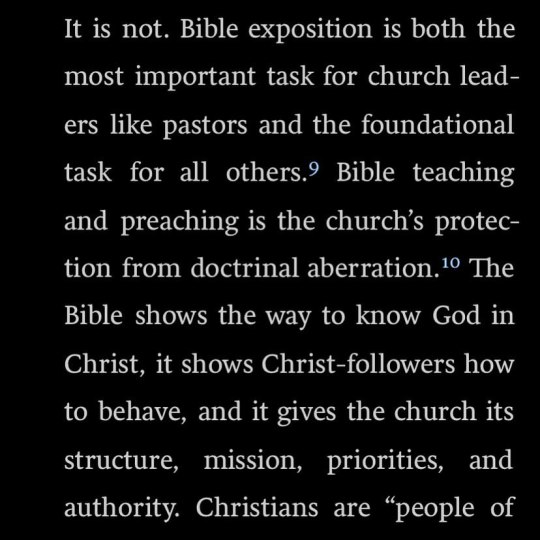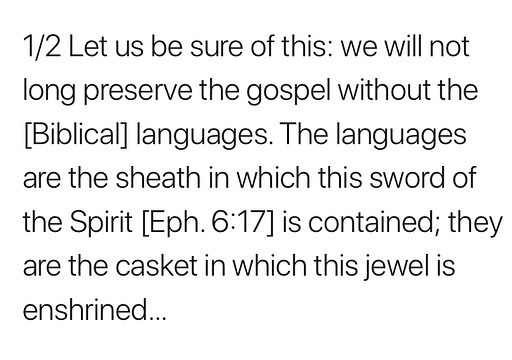#biblicallanguages
Text

Does the Phrase Ἔτι ἅπαξ in Hebrews 12.26 Mean “Once” or “Once More”?
By Bible Researcher Eli Kittim 🎓
The New Testament Versions
There are various theories about past catastrophic Biblical events. For example, some biblical narratives describe a time when the earth trembled, such as the mighty earth-quake at Mount Sinai when God gave Moses the Ten Commandments, or the cataclysmic Noachian Deluge. Some Biblical scholars even theorize about a so-called “Gap Theory" (between the first and second verses of Genesis) regarding two different creations, or even an earlier creation-and-destruction of the universe prior to the current one.
So when we encounter biblical verses that seem to suggest some type of primordial earthly destruction, scholars often theorize about the probability of such events taking place as the ones mentioned above. Hebrews 12.26 is a case in point. It talks about some form of judgment in which God “will shake not only the earth but also the heavens.” But there seems to be a difference of opinion as to whether or not this event will happen for the very first time. That’s because the key phrase Ἔτι ἅπαξ has been variously translated in two different ways: “once” and “once more.” The former suggests a first time, the latter, a second. Hence, the meaning of the text remains an open question. Hebrews 12.26 (SBLGNT) declares:
οὗ ἡ φωνὴ τὴν γῆν ἐσάλευσεν τότε, νῦν δὲ
ἐπήγγελται λέγων · Ἔτι ἅπαξ ἐγὼ σείσω οὐ
μόνον τὴν γῆν ἀλλὰ καὶ τὸν οὐρανόν.
Translation (NIV):
At that time his voice shook the earth, but
now he has promised, ‘Once more I will
shake not only the earth but also the
heavens.’
Most of the Bible versions of Hebrews 12.26 (with the exception of a few that I’m aware of) translate Ἔτι ἅπαξ as “once more.” That’s because Ἔτι can mean not only “still,” “yet,” “again,” but it can also relate to *time* and mean “longer” (Mt. 5.13; Lk 16.2; 20.36; Jn 7.33), “further” (Mt. 26.65; Lk 22.71), as well as “moreover” (Acts 2.26).
So, if the correct translation of Heb. 12.26 is “Once more I will shake not only the earth but also the heavens,” then the question arises: is this verse referring to Mt Sinai, the flood, the gap theory, or perhaps to a previous universe that was once-destroyed to make way for the creation of our own?
For example, one particular Bible version speculates that the reference in Heb. 12.26 is to the mighty earth-quake at Mount Sinai. The Amplified Bible reads:
His voice shook the earth [at Mount Sinai]
then, but now He has given a promise,
saying, ‘YET ONCE MORE I WILL SHAKE
NOT ONLY THE EARTH, BUT ALSO THE
[starry] HEAVEN.’
However, on closer inspection, the aforementioned translation is speculative because this “shaking” does not only involve the earth but also the heavens. At Mount Sinai, only the earth trembled (with a mighty earth-quake), not the heavens. Similarly, during the flood, neither the earth nor the heavens were destroyed: only living things (Genesis 6.7). So, the Hebrews 12.26-reference seems to imply a much larger catastrophic destruction of both the earth and the heavens. Therefore, if the verse has been faithfully translated, it can only refer to the so-called “gap theory,” or to a previously-destroyed universe.
On the other hand, the majority of the translations might be completely flawed, and the few Bible versions which suggest that this event will occur only “once” might be correct! Accordingly, the YLT version of Hebrews 12.26 proclaims:
‘Yet once -- I shake not only the earth, but
also the heaven.’
Similarly, the Darby Bible Translation exclaims:
Yet once will I shake not only the earth, but
also the heaven.
We find a similar reading in the Godbey New Testament:
I will still once shake not only the earth, but
also heaven.
Therefore, these latter versions would imply that this impending destruction will occur only once, in the future, in the same way as described, for example, in 2 Peter 3.10!
The Old Testament Versions
In trying to figure out the correct translation, it’s important to go back and look at the sources of the quoted material from the Hebrew Bible and the Septuagint. Hebrews 12.26 is actually quoting Haggai 2.6 via the Septuagint. Therefore, let’s go back and look at what that verse actually says both in the Hebrew Bible and in the Greek Septuagint. Haggai 2.6 (NIV) reads:
This is what the LORD Almighty says: ‘In a
little while I will once more shake the
heavens and the earth, the sea and the dry
land.’
It’s important to note that most of the modern Bible versions of Haggai 2.6 say “once more,” but some say “once” (see e.g. ASV, Douay-Rheims Bible, Good News Translation, JPS Tanakh 1917, and a few others). The KJB also says “once” at Haggai 2.6:
For thus saith the LORD of hosts; Yet once,
it is a little while, and I will shake the
heavens, and the earth, and the sea, and
the dry land;
Here, however, the KJB is inconsistent. While it says “once” in Haggai 2.6, it says “once more” in the parallel verse of Hebrews 12.26:
Yet once more I shake not the earth only,
but also heaven.
In Haggai 2.6, the Hebrew text (BHS) has אַחַ֖ת (once) ע֥וֹד (yet/again). In other words, the term ע֥וֹד (od) can be translated either as “yet” or “again.” But even the Hebrew Bible versions have conflicting translations. For example, the Sefaria Bible implies that this destructive event will occur only “once.” It reads thusly:
For thus said the LORD of Hosts: In just a
little while longer I will shake the heavens
and the earth, the sea and the dry land.
Similarly, the JPS Tanakh (1985) says:
For thus said the LORD of Hosts: In just a
little while longer I will shake the heavens
and the earth, the sea and the dry land.
The Biblia Hebraica Stuttgartensia (BHS) also seems to suggest “yet once in a little while”:
כִּ֣י כֹ֤ה אָמַר֙ יְהוָ֣ה צְבָאֹ֔ות עֹ֥וד אַחַ֖ת מְעַ֣ט הִ֑יא וַאֲנִ֗י מַרְעִישׁ֙ אֶת־הַשָּׁמַ֣יִם וְאֶת־הָאָ֔רֶץ וְאֶת־הַיָּ֖ם וְאֶת־הֶחָרָבָֽה׃
By contrast, the Hebrew Bible——edited by translator and scholar, Rabbi A.J. Rosenberg——featured in Chabad.org reads:
For so said the Lord of Hosts: [There will
rise] another one, and I will shake up the
heaven and the earth and the sea and the
dry land [for] a little while.
So, even these Hebrew versions conflict. Most of them imply “once,” while the last one suggests “another.” So there are arguments on both sides. However, the most credible ones seem to suggest “once” for all. That’s probably why the Greek translations (LXX & NT) employ the term hapax (ἅπαξ), which also means “once for all”!
Let’s now explore how the Greek Septuagint (LXX) translates it. The LXX renders Haggai 2.6 thusly:
διότι τάδε λέγει Κύριος παντοκράτωρ· ἔτι
ἅπαξ ἐγὼ σείσω τὸν οὐρανὸν καὶ τὴν γῆν
καὶ τὴν θάλασσαν καὶ τὴν ξηράν·
English translation by L.C.L. Brenton:
For thus saith the Lord Almighty; Yet once I
will shake the heaven, and the earth, and
the sea, and the dry [land].
Thus, the Septuagint agrees with most of the Hebrew Bible versions that Haggai 2.6 is saying “once,” not “once more.”
Interestingly enough, Hebrews 12.26 quotes the Septuagint-phrase ἔτι ἅπαξ ἐγὼ σείσω verbatim (word for word), with a slight variation on the theme concerning “the heavens and the earth” at the end of the sentence. Hebrews 12.26 reads:
Ἔτι ἅπαξ ἐγὼ σείσω οὐ μόνον τὴν γῆν
ἀλλὰ καὶ τὸν οὐρανόν.
Notice that both the LXX and the NT texts use the exact same key-phrase ἔτι ἅπαξ. Yet the LXX and most of the Hebrew versions say “once,” while most of the New Testament translations render it as “once more.” So which is it? If both the Septuagint and the New Testament are saying the exact same thing, then why are these texts translated differently? Both cannot be correct. According to the law of non-contradiction, contradictory statements cannot both be true. So, somewhere, somehow, someone got it wrong! The question is, what’s the right answer? What’s the correct translation?
Conclusion
The Septuagint translates the term עוֹד (od) as ἔτι (yet), and renders the phrase ‘ō·wḏ ’a·ḥaṯ as “yet once.” As far as the Hebrew translations are concerned, both the Sefaria Bible and the JPS Tanakh (1985) imply “once.” The BHS also seems to imply “once.” Only the Chabad.org Bible (with Rashi's commentary) seems to suggest “once more.” So, most of the Old Testament Hebrew and Greek texts support the phrase “yet once,” not “once more” or “once again”! All in all, from the point of view of the Old Testament concerning Haggai 2.6, it seems that both the Hebrew and the Greek versions agree on the “yet once” meaning!
Carrying this information over into the New Testament, we come to realize that the key phrase (ἔτι ἅπαξ) in Haggai 2.6 (LXX), which is quoted in Hebrews 12.26, should have the exact same meaning in the New Testament as it does in the Old Testament, namely, “yet once.” Yet, surprisingly, most of the modern NT translations say “once more,” although there are some that do say “once,” as has already been noted. Therefore, the modern translations of the New Testament are actually conflicting with the Old Testament data. Apparently, the range of meanings for the word Ἔτι makes it unclear as to which word should be applied.
So, if we combine our findings, it seems that more attention should be placed on the Hebrew and Greek Old Testament versions from which the quote of Haggai 2.6 is derived. Given that they are the sources of the Hebrews 12.26-phrase, the usages in these versions carry more weight than those of the New Testament translations in steering us in the right linguistic direction. Therefore, despite the fact that most of the modern Bible versions have “once more” for Hebrews 12.26, the few translations that have “yet once” (e.g. the YLT, Darby, etc.) might be closer to the truth!
Bottom line, given the range of meanings for the aforementioned terms, it’s difficult to pinpoint the exact rendering of both the Haggai 2.6 and Hebrews 12.26 phrases, especially since even the Hebrew translations have divergent meanings. Nevertheless, given that most of the Hebrew and Greek Old Testament versions agree on the phrase “yet once,” it seems more likely that this is the authorial intent of Haggai 2.6. And since that happens to be the exact same phrase in Hebrews 12.26, there’s no reason for the meaning to be any different than that which we find in Haggai 2.6 (LXX). Thus, it appears that the meaning of Hebrews 12.26 is faithfully translated in the YLT version which reads:
‘Yet once -- I shake not only the earth, but
also the heaven.’
This exegetical conclusion, of course, would not support the so-called “Gap Theory" or an earlier destruction of the universe prior to the current one. Rather, it would point to one final destruction at the end of the world!
#biblical greek#Biblicallanguages#Ἔτι#ἅπαξ#Hebrews12v26#Haggai2v6#lxx#JPSTanakh#GapTheory#ע֥וֹד#Sefaria#אַחַ֖ת#elikittim#hebrew bible#septuagint#ek#the little book of revelation#ελικιτίμ#LCLBrenton#Bible exegesis#το μικρο βιβλίο της αποκάλυψης#BibliaHebraicaStuttgartensia#2Peter3v10#Bible translations#RabbiAJRosenberg#new testament#old testament#bible study#day of the lord#εκ
5 notes
·
View notes
Photo

Just got this... looks like an instant page-turner. #books #HebrewBible #BiblicalLanguages #TheBible #BibleTranslation https://www.instagram.com/p/CHWiCImAxhi/?igshid=1lx2nrcjwjvf3
2 notes
·
View notes
Photo

Interlinear Bible Sale! 📖 This Bible features the complete Hebrew and Greek texts with a direct English rendering below each word. It also includes The Literal Translation of the Bible in the outside column. Now get this time-saving tool for researching the subtle nuances and layers of meaning within the original biblical languages on sale. Normally $79.95 but, now on sale for $29.99 through September 7, 2021. Link in our bio! #rosepublishing #interlinearbible #biblicalgreek #biblicalhebrew #bible #biblicallanguages #biblicallanguage #biblestudy #langauagestudy #academic #seminary #seminarystudents #biblicalresources #bookstagram #christianbookstagram https://instagr.am/p/CTUgEsBMr3G/
3 notes
·
View notes
Photo

Divina Letra | 1 #João 2:16 | Pois tudo que há no #mundo - a #cobiça da #carne, a cobiça dos #olhos e a #ostentação dos bens - não provém do #Pai, mas do mundo. #PazDeCristo! @DivinaLetra | https://goo.gl/whbmhV #DivinaLetra #cristo #cristojesus #católica #catolica #bibliasagrada #jesuschrist #jésus-christ dieu #bible amem #amém #tempodedeus #mensagemdedeus #mensagemdefé versículo igreja #deuspoderoso #evangelho #gospel #deusdepromessas #deusnocontrole #mulheresvirtuosas #crente #cristã #santidade foi -------------- @DivinaLetra --------------- Se gostou; Curta, Compartilhe e Inscreva-se para receber novidades de Divina Letra, o qual é de Deus, com Deus e para Deus. --------------- @DivinaLetra --------------- E, também, siga Divina Letra nas redes sociais: Facebook: https://goo.gl/Zu5Jpz | https://goo.gl/wm26z6 --- YouTube: https://goo.gl/whbmhV --- Instagram: https://goo.gl/W1uarr --- Twitter: https://goo.gl/Z9Cyms --- GooglePlus: https://goo.gl/7Qe6XG --- Pinterest: https://goo.gl/Qvb6xE --- Tumblr: https://goo.gl/AZymyF --------------- @DivinaLetra --------------- Parceiros: @LenguajeBiblico @LinguagemDeDeus @BiblicalLanguage @LangageBiblique
#deusdepromessas#catolica#cristã#tempodedeus#bibliasagrada#mundo#mensagemdedeus#jésus#jesuschrist#pazdecristo#amém#evangelho#joão#católica#cobiça#ostentação#deuspoderoso#divinaletra#gospel#olhos#bible#mulheresvirtuosas#crente#mensagemdefé#santidade#carne#pai#cristojesus#deusnocontrole#cristo
2 notes
·
View notes
Photo

Biblical Language | But the fruit of the Spirit is love, joy, peace, forbearance, kindness, goodness, faithfulness, gentleness and self-control. Against such things there is no law. Galatians 5:22-23 @BiblicalLanguage | https://goo.gl/whbmhV #BiblicalLanguage #god #jesus #christ #jesuschrist #bible #newtestament #oldtestament #church #temple #christian #faith #hope #honorandglory #prayer #catholic #evangelical #christpeace #promise #readthebible #love #verse #gospel #godisfaithful #lord #faithingod ----------------- @BiblicalLanguage If you liked, Short, Subscribe, Share and follow us on social networks: YouTube: https://goo.gl/whbmhV --- FaceBook: https://goo.gl/cEXHrB --- Twitter: https://goo.gl/V5wcYs --- Instagram: https://goo.gl/mc68Mr --- Site: www.DivinaLetra.com.br
#biblicallanguage#god#jesus#christ#jesuschrist#bible#newtestament#oldtestament#church#temple#christian#faith#hope#honorandglory#prayer#catholic#evangelical#christpeace#promise#readthebible#love#verse#gospel#godisfaithful#lord#faithingod
1 note
·
View note
Text

An Additional Nuance of Meaning to Πονηρός (ponērós)
By Bible Researcher Eli Kittim 🎓
Definitions of Πονηρός (ponērós)
Koine is the immediate ancestor to modern Greek and the language that’s still used in the liturgy of the Greek Orthodox Church. In modern Greek, πονηρός (ponērós) means “cunning, sneaky, sly, wily, devious, insidious,” as well as “evil.” And since many linguists claim that Koine is very close to modern Greek, I propose that the New Testament (NT) definition of ponērós, in many instances, has certain sinister undertones of “cunning” and “devious” cognition. I intend to demonstrate that by looking at the way the term is used in both the Septuagint (LXX) and the NT. This is not an exhaustive study, by any means, but it does have sufficient evidence to at least warrant such an endeavor.
Mounce gives us several standard meanings of πονηρός (ponērós), such as evil, afflictive (Eph. 5:16; 6:13; Rev. 16:2), the evil one, or the devil (Mt. 13:19, 38; Jn. 17:15). But he also adds envious (Mt. 20:15; Mk. 7:22) and covetous (Mt. 7:11) to the list. Both of these terms presuppose planning, premeditation, scheming, plotting, and the like, in order to achieve these ends. In other words, these intentions originate from thoughts and imaginations that can, if they’re quite overwhelming, turn people into evil and malicious beings. So, I’m basically trying to demonstrate that the word ponērós has the added connotative meaning of “cunning” or “crafty” in koine Greek, which has been neglected by modern lexicons.
Πονηρός (ponērós) in the LXX
The LXX has many instances where ponērós could mean “affliction” (Gen. 12:17; Deut. 7:15) or “grievous” (Exod. 33:4), or simply “evil” (Gen. 2:9). However, there are cases where the definition of ponērós goes beyond the standard definitions and implies “thinking evil thoughts” (Gen. 6:5). Case in point, the English translation by L.C.L. Brenton of Gen. 8:21 (LXX) reads:
the imagination [διάνοια] of man is intently
bent upon evil [πονηρὰ] things.
The LXX demonstrates that the functional aspect of ponērós is not just thinking but also uttering evil words. Gen. 31:29 (LXX) writes:
speak not evil [πονηρά] words.
Numbers 11:1 (LXX) goes even further by showing that the term ponērós suggests a certain amount of premeditated plotting in a cunning or underhanded fashion:
the people murmured sinfully [πονηρά]
before [έναντι] the Lord [Κυρίου].
In other words, the people complained, not in a justifiable way, but rather “sinfully” (πονηρά], which suggests that they were plotting against God in a devious and insidious manner.
In Num. 14:27 (LXX) God declares that those “murmuring against me” (γογγύζουσιν εναντίον μου) are a “wicked generation” (την συναγωγήν την πονηράν). That is to say, these people are murmuring and planting seeds of dissension, plotting against God in an attempt to create discord and division.
Numbers 14:36-37 (LXX) suggests that those who were dispatched by Moses to scout out the Land of Canaan were slandering God by devising lies and false reports. Numbers 14:36 (LXX) reads as follows:
[they] murmured against it to the assembly
so as to bring out evil words concerning the
land [ρήματα πονηρά περι της γης].
Numbers 14:37 (LXX) is even clearer, suggesting that these were false and fabricated reports. Numbers 14:37 (LXX) says thusly:
the men … spoke evil [πονηρά] reports
against the land.
As we move on to Gen. 50:20 (LXX), it becomes apparent that the word πονηρά implies underhanded schemes and evil plots. Gen. 50:20 (LXX) reads as follows:
ὑμεῖς ἐβουλεύσασθε κατ᾿ ἐμοῦ εἰς πονηρά.
English translation by L.C.L. Brenton:
Ye took counsel against me for evil.
This was a case where wily and devious ideas where exchanged, evil plots were devised and considered, and then cunningly executed.
Similarly, Isaiah 32:7 (LXX) says:
For the counsel of the wicked [πονηρῶν]
will devise iniquity.
In other words, the term πονηρῶν indicates devising, plotting, and scheming in an underhanded way.
Finally, our last example comes from Psalm 109:20 (which is actually 108:20 LXX). It reads:
τοῦτο τὸ ἔργον τῶν ἐνδιαβαλλόντων με
παρὰ Κυρίου καὶ τῶν λαλούντων πονηρὰ
κατὰ τῆς ψυχῆς μου.
English translation by L.C.L. Brenton:
This is the dealing of the Lord with those
who falsely accuse me, and of them that
speak evil against my soul.
It becomes clear, then, that πονηρὰ means false allegations, false claims, or downright lies! Thus, πονηρὰ refers to cunning plots and schemes.
Πονηρός (ponērós) in the NT
Matthew 5:37, 6:13, and 13:19 all have the standard ponērós (πονηροῦ/πονηρὸς) meaning that refers to Satan per se. But Mt. 5:11 links insults (ὀνειδίσωσιν), lies, and slanders (ψευδόμενοι) to the term *ponērós* because it refers to cunning deceivers who “falsely say all kinds of evil [πᾶν πονηρὸν] against” the elect. Thus, false accusations, slanders, insults, and personal attacks are all considered as part of the wily, devious, and evil (ponērós) schemes that are often used to persecute Christians.
Matthew 9:4 identifies the thoughts in our hearts as being ponēra (πονηρὰ) or evil. Thus, we all have ponēra thoughts. Matthew 20:15 adds more color to the mix because it translates πονηρός as envious or jealous, depending on which Bible version you read. Finally, Matthew 15:19 presents a list in which he identifies evil thoughts (διαλογισμοὶ πονηροί). The list is as follows: 1) premeditated murders, which are certainly insidious, 2) adulteries and sexual immorality, which involve lies and deceptions in order to keep the affair concealed; 3) thefts are also included as διαλογισμοὶ πονηροί, which require the thief to be cunning, sneaky, and sly in order to achieve his aims; 4) false testimonies fall under the same category of deviousness and deception; 5) slanders are also part of the scheming διαλογισμοὶ πονηροί, as they cunningly aim to dishonor and discredit people.
Mark 7:22 defines ponērós as a cunning deception because it undergirds covetousness, lies, slanders, and pride (cf. 1 Jn 2:16). So Mark adds greed, malice, deceit, envy, slander, and arrogance to the list of meanings associated with the Greek word “ponērós.”
Conclusion
As we have seen, both the LXX and the NT often define ponērós as a cunning and devious cognition. Numbers 11:1, for example, demonstrates that ponērós means plotting & devising in a cunning and underhand fashion. The text suggests that the people were plotting against God in a devious and insidious manner. Similarly, Numbers 14:36-37 (LXX) suggests that ponērós is associated with slanders, lies, and false reports. In Psalm 109:20 (108:20 LXX), it becomes clear that πονηρὰ means false allegations, false claims, or downright lies! Thus, it refers to cunning plots and schemes.
And in the NT, Mt. 5:11 links insults, lies and slanders to the term ponērós because it refers to cunning deceivers who “falsely say all kinds of evil [πᾶν πονηρὸν] against” the elect. Thus, false accusations, slanders, insults, and personal attacks are all considered as part of the wily, devious, and evil (ponērós) schemes that are often used to persecute Christians.
Mark 7:22 defines ponērós as a cunning deception because it undergirds covetousness, lies, slanders, and pride (cf. 1 Jn 2:16). So Mark adds greed, malice, deceit, envy, slander, and arrogance to the list of meanings associated with the Greek word “ponērós.” As we have seen, in both the LXX & the NT, aside from the standard meanings of πονηρός (ponērós)——such as evil, afflictive, the evil one, or the devil——there are additional connotative meanings which suggest the terms “cunning, crafty, sneaky, sly, wily, devious, insidious, slanderous, and deceitful.” Thus, the koine word ponērós does have the modern-Greek connotative meaning of “cunning,” which has been neglected by modern lexicons!
#crossreference#greekconcordance#wordstudies#ek#koinegreek#greekexegesis#NewTestamentGreek#biblicallanguages#HellenisticGreek#elikittim#ΕλληνιστικήΚοινή#Alexandriandialect#commonAttic#biblical greek#ΚαινήΔιαθήκη#the little book of revelation#Πονηρός#εκ#ponērós#cunning#moderngreek#lxx#ελικιτίμ#συγγραφέας#LCLBrenton#το μικρό βιβλίο της αποκάλυψης#septuagint#ρήματαπονηρά#ΜετάφρασητωνΕβδομήκοντα#Bibleresearcher
3 notes
·
View notes
Text

How Should Christian Scholars Respond to Attacks and Insults?
By Bible Researcher and Author Eli Kittim 🎓
Now these people were more noble-minded
than those in Thessalonica, for they
received the word with great eagerness,
examining the Scriptures daily to see
whether these things were so.
——- Acts 17:11 NASB
Should We Believe What Others Say Or Should We Investigate the Scriptures for Ourselves?
People believe in historical Christianity. They believe that if Christianity is not historical then nothing else about the Bible is true. They cannot interpret it in any other way. They can only see it backwards; never forwards. But what ever happened to Bible prophecy? Take, for example, the idea of questioning the historicity of a Biblical event, wondering whether it happened in the past or if it will happen in the future. Isn’t that ultimately a question of faith?
People believe in a historical Jesus and in the so-called “historical” gospel narratives. Believers think that if Jesus didn’t exist——or if he didn’t die and wasn’t resurrected in the past——then everything else in the New Testament is complete and utter fiction, fabricated out of whole cloth, and therefore false. For them, it’s all about past history. But future history (aka Bible prophecy) is just as valid! The notion that Jesus came in the flesh *at some point in human history* somehow seems to escape their hermeneutical purview. It never really occurred to them that if these incidents in the life of Jesus are prophesied to take place in the future, then the Bible is just as valid and just as reliable as if these events had happened in the past. Why? Because the Bible is ultimately not a historical chronicle but a Book on Faith!
People believe what they hear. But sometimes that’s just fake news or long-held assumptions that are based on *wrong interpretations* of the facts. The story of Jesus’ past death and resurrection is a story that has been told millions of times at the dinner table, on television, during Christmas, Easter, in all churches and denominations, it’s heard from preachers in the pulpit, it’s repeated by missionaries, taught in seminaries, and has generally been reiterated by pastors and teachers throughout the culture for thousands of years. So, it’s as if it is written in stone. It’s a foregone conclusion. It’s considered to be an undeniable fact. But what if a thorough Biblical investigation challenged any of these points? What then? Mind you, this type of inquiry would only be challenging *the man-made interpretations,* not the actual words of the Bible per se!
——-
A Biblical Consensus Is Always Evolving
In science, the role of agreement is paramount in establishing empirical facts, and it’s only through verifiable evidence that an epistemic agreement can be reached. However, the body of empirical knowledge is constantly changing. New information is constantly assessed and prior conclusions are always re-examined. What appeared to be a fact yesterday may not be so today. And the methodology is constantly improving and evolving. Today, we have better criteria and more knowledge at our disposal to understand the Bible than ever before. Therefore, our biblical findings can certainly change our previous assumptions and presuppositions. The Biblical consensus has changed considerably over time. With new interdisciplinary evidence at our disposal, our conclusions about Biblical authorship and composition have gradually changed. New evidence in lower and high criticism has prompted new questions that require a new set of criteria and more advanced methodologies to address them. So, as a rule, new findings replace older “facts,” thereby changing the previous consensus!
For example, advances in textual criticism have shown that Moses was not the author of the Pentateuch. The date of the Pentateuch’s composition is also not as early as once believed. In fact, the scholarly consensus is that Moses probably never existed and that the Exodus never happened: it is a foundation myth. As it happens, no archaeological remains have ever been found in the Sinai Peninsula regarding the exodus or the Israelites.
But try telling that to Orthodox Jews who hold these “truths” to be self-evident, sacred, and non-negotiable. For them, history, archaeology, textual criticism, and Biblical studies are a “demonic” attempt to undermine their faith. But is that true? Of course not! On the contrary, many who are involved in these scientific and Biblical disciplines are themselves faithful Jews and Christians.
Then there was the emergence of other academic disciplines and methods that investigated the historical precursors of the biblical texts. Some of these were “source criticism” and “form criticism,” from which “redaction criticism” was derived. Finally, literary criticism added a new way of looking at the authorial intent via such methods as narrative criticism, rhetorical criticism, and canonical criticism. These emerging methods of biblical criticism, which did not previously exist, ultimately changed how we view and understand the Bible.
For example, the idea that the New Testament authors quoted predominantly from the Greek Old Testament rather than from the Jewish Bible must have certain important textual ramifications. Also, without the understanding of “intertextuality”——the literary dependence of the New Testament on the Old Testament——we would not know what literary material was borrowed from the Hebrew Bible. All you have to do is pick up a chain-reference Bible and you’ll see how much of the Old Testament is found in the New Testament, and how many words, speeches, and events that are attributed to Jesus are actually modelled on these earlier stories. These academic disciplines pave the way for a deeper understanding on various levels that heretofore were untraversed and unknown.
But how, then, can one explain to a believer that Jesus didn’t really say or do that? That it was just a literary narrative in which the evangelist put Jesus in a certain theological context in order to show that he is the prophesied Messiah of Hebrew Scripture. So, it seems that one must put away their emotional component when involved in this type of inquiry. One must leave their ego at the door. That is to say, one must temporarily suspend faith and atheism in dealing with Biblical studies. That’s because, just as in science, pure objectivity is strictly required. Once a person has gathered all the necessary evidence, they can then try to ascertain how it might fit with or be relevant to his/her faith, or how it may further inform it.
There are also many cross-reference and concordance studies that reveal Biblical *meanings* by focusing on certain repetitive linguistic idiomatic expressions, as they’re found throughout scripture. Parallel passages and verbal agreements help to further identify certain *meanings* that are consistently found across the text. Then there are the Biblical languages. Studying the original Biblical languages in Paleo-Hebrew and Koine Greek help us to create faithful and competent translations, which involve a more accurate knowledge and understanding of scripture’s details about timing, location, and authorial intention. Moreover, parsing (or syntax analysis) helps us to further understand the grammar and morphology of the Biblical languages! These methodologies are invaluable in providing a solid foundation that may not always be consistent with previous assumptions. Discoveries in these areas are obviously worthy of serious consideration.
But how do you explain these facts to a simple layperson who may think otherwise? In their eyes, you are seen either as a traitor to the faith, at best, or guided by the deceiver, at worst. To a believer——who is not engaged in these types of studies but reads the Bible literally and superficially——writing about these findings and complex issues may be interpreted as preaching godless heresies. In his/her mind you are simply a false teacher. . . And despite Jesus’ appeal for unity in the church (John 17:21), there have always been fights and quarrels among Christians (James 4:1). It has also become a fashion lately to slander Bible teachers. Many are quick to point fingers at each other and accuse other Christians of wrongdoing. This is antithetical to scripture!
In this case, the only thing a Bible scholar can do is to remind the reader that objectivity rather than fanaticism is more fruitful in biblical interpretation, and that name-calling is not biblical evidence. In fact, scholars welcome the opportunity for peer-review and academic criticism!
#biblestudies#Biblicalexegesis#biblicallanguages#interdisciplinarystudies#bibleprophecy#adhominemattacks#defamation#slander#acts17v11#το_μικρό_βιβλίο_της_αποκάλυψης#εκ#apocalypticChristianity#theJesusprophecy#elikittim#christian apologetics#thelittlebookofrevelation#ελικιτίμ#ek#BookofFaith#intertextuality#historicalChristianity#libel#christianinsults#christianattacks#accursed#false teachers#anathematize#heresies#false teachings#excommunication
6 notes
·
View notes
Text

Are the So-Called “gods” of the Old Testament Angels or Men?
By Author Eli Kittim 🎓
“Is it not written in your law, ‘I said, you are
gods'? “ (Jn 10.34).
Are the gods Human?
First, whatever the exegesis might be, and regardless of the diverse interpretations, it is certainly NOT the case that we’re all gods, equal to Jesus and God the father, the co-creators (Jn 1.1-3; Heb. 1.1-2).
That is not the authorial intent of the term “gods” in Jn 10.34, nor Jesus’ explanation of it, where he actually appeals to the Old Testament terminology regarding the “sons of god” (vv. 34-36) in order to apply it to his particular status as the unique Son of God (Υἱὸς τοῦ Θεοῦ SBLGNT).
Second, the notion that the term “gods” refers to men is refuted by both the Masoretic and LXX texts which suggest that these are rulers and powers in God’s kingdom, namely, the angelic host. For instance, in Genesis 6.2, “the sons of god” (בְנֵי־ ḇə·nê הָֽאֱלֹהִים֙ hā·’ĕ·lō·hîm) are clearly fallen angels.
Third, Ephesians 3.10 speaks of “rulers and authorities in the heavenly realms.” Ephesians 6.12 says:
our struggle is not against flesh and blood,
but against the rulers, against the
authorities, against the powers of this dark
world and against the spiritual forces of evil
in the heavenly realms.
Ephesians 1.21 differentiates Jesus (God) from all other heavenly powers, indicating that he’s “above all rule and authority, power and dominion, and every name that is invoked, not only in the present age but also in the one to come.” These then are the rulers and powers in high places, the sons of Elohim who are called “gods” in Ps 82.6, not men.
Psalm 82
The Greek text of the Septuagint from the LCL Brenton edition/“translation” of Psalm 82 (Ps. 81 LXX) reads as follows:
1 Ο ΘΕΟΣ ἔστη ἐν συναγωγῇ θεῶν, ἐν μέσῳ δὲ θεοὺς διακρινεῖ. . . . 6 ἐγὼ εἶπα· θεοί ἐστε καὶ υἱοὶ ῾Υψίστου πάντες· 7 ὑμεῖς δὲ ὡς ἄνθρωποι ἀποθνήσκετε καὶ ὡς εἷς τῶν ἀρχόντων πίπτετε. 8 ἀνάστα, ὁ Θεός, κρίνων τὴν γῆν, ὅτι σὺ κατακληρονομήσεις ἐν πᾶσι τοῖς ἔθνεσι.
NRSV translation
1 God has taken his place in the divine council; in the midst of the gods he holds judgment: . . . 6 I say, "You are gods, children of the Most High, all of you; 7 nevertheless, you shall die like mortals, and fall like any prince." 8 Rise up, O God, judge the earth; for all the nations belong to you!
First, notice that just like the angelic host who are called “sons of God” in Gen. 6.2, in Ps. 82 the term “gods” does not imply deity but rather being “children of the Most High” (v. 6) or υἱοὶ ῾Υψίστου (LXX). Second, if they are in fact “gods,” divine as it were, why then will they “die like mortals” (v. 7)? That would contradict their divine status. What is more, the text DOES NOT say that they ARE mortals, but that they will die AS IF they were mortals. The text seems to be addressing the evil angelic host that rebelled against God the most high. Besides, if they were in fact mortals, why would they die “like” mortals? The analogy only works if they were something other than mortals and are being compared to mortals. You don’t say to a mortal that you’re going to die like a mortal. That’s a given if he’s a mortal. You can only use this language if the person is something other than a mortal.
Question: So if these beings are neither divine nor mortal, then what are they?
Answer: part of the angelic hierarchy of rulers and powers.
The clue is given in the very first verse of Psalm 82:
Ο ΘΕΟΣ ἔστη ἐν συναγωγῇ θεῶν, ἐν μέσῳ
δὲ θεοὺς διακρινεῖ (LXX).
Translation:
God has taken his place in the divine
council; in the midst of the gods he holds
judgment.
Question: When did God Almighty ever summon the judges & rulers of Israel in his presence for a divine council?
Answer: Never!
The phrase συναγωγῇ θεῶν (divine council; in the midst of the gods) can only refer to heavenly places. Thus, the idea that the term “gods” refers to men is unwarranted and without merit!
It’s also important to note that the use of the word “gods” as a reference to human beings in the Old Testament is rare.
God versus gods: Elohim versus elohim
The language of 1 Chronicles 5.25 is one which pits “God” against “gods,” which in the Hebrew language is actually Elohim versus elohim. Since Biblical Hebrew is an “aspectual” language, it’s the *context* that determines the meaning:
But they transgressed against the God
[Elohim] of their ancestors, and prostituted
themselves to the gods [elohim] of the
peoples of the land, whom God [Elohim]
had destroyed before them.
The Septuagint sets it up as the God of their fathers (ἐν Θεῷ/ὁ Θεὸς πατέρων αὐτῶν) versus the gods of the peoples of the earth (θεῶν τῶν λαῶν τῆς γῆς).
In 2 chron. 32.17, “the Lord the God of Israel [Yahweh Elohim]” or the “God [Elohim] of Hezekiah” is pitted against the “gods [elohim] of the nations.” The LXX distinguishes the terms as the Lord God of Israel/God of Hezekiah (Κύριον Θεὸν ᾿Ισραὴλ/Θεὸς ᾿Εζεκίου) versus the gods of the nations of the earth (οἱ θεοὶ τῶν ἐθνῶν τῆς γῆς). So despite the fact that identical words are used for both one God and many gods, the difference is clear based on the context. For example, in Deuteronomy 12.31, “the Lord your God [Yahweh Elohim]” is distinguished from “their gods [elohim].” Similarly, the LXX differentiates the terminology as your God (Θεῷ σου), which refers to the true God, versus their gods (θεοῖς αὐτῶν), which is elsewhere depicted as the false gods or idols. Notice that the designation “gods” in all these examples is not a reference to humans.
Another way to distinguish Yahweh Elohim from all the other elohim is that he is addressed as the “God of gods” (Θεὸς θεῶν LXX) in Dan 2.47, and elsewhere as the “creator” or the “most high” (Deut. 32.15; Gen. 14.22). Even though the Hebrew term elohim is sometimes translated as “judges” in Exodus 22.8, 9, nevertheless the LXX clarifies that those who are said to judge do so in the presence of God (ἐνώπιον τοῦ Θεοῦ). Hence the reference is to God, not men.
Eloha Versus El
Eloha could refer to a True or a false god. To determine which is which, it all depends on the context. For example, Deut. 32.15 is clear that this is a reference to (אֱל֣וֹהַ ’ĕ·lō·w·ha), the God of Israel, the creator who made him (עָשָׂ֔הוּ ā·śā·hū). The LXX clarifies this Eloha as the God who made him (Θεὸν τὸν ποιήσαντα αὐτὸν), as well as the God of his salvation (Θεοῦ σωτῆρος αὐτοῦ). In Deut 32.17 there’s a difference between Eloha (אֱלֹ֔הַ God) and elohim (אֱלֹהִ֖ים gods). The Septuagint presents the dichotomy as one God (Θεῷ) versus many gods (θεοῖς). Although in 2 Chronicles 32.15 ’ĕ·lō·w·ha (אֱל֙וֹהַ֙) is used as “god,” but not as the true God, in Nehemiah 9.17 ’ĕ·lō·w·ah (אֱל֨וֹהַּ) is now the true God (Θεὸς LXX). In fact, in Ps. 114.7 ’ĕ·lō·w·ah (אֱל֣וֹהַּ) is the God of Jacob (τοῦ Θεοῦ ᾿Ιακὼβ LXX). So context is king!
El, on the other hand, is usually a reference to the Almighty, but the term could also be used to refer to both God or god. For example, in Gen. 14.18 Melchizedek is priest of God (לְאֵ֥ל el) most high (עֶלְיֽוֹן׃ el·yō·wn), which in vv. 19-20 is associated with the God of Abram (Αβραμ τῷ Θεῷ τῷ ὑψίστῳ LXX). But in verse 22 he is identified as יְהוָה֙ Yah·weh God (אֵ֣ל el) most high. The Septuagint confirms this viewpoint as it says in v. 18 that Melchizedek is a priest of God most high (Μελχισεδέκ ἱερεὺς τοῦ Θεοῦ τοῦ ὑψίστου). In verse 22, the LXX calls God, the most high, the creator of heaven and earth (τὸν Θεὸν τὸν ὕψιστον, ὃς ἔκτισε τὸν οὐρανὸν καὶ τὴν γῆν). In Gen. 16.13, Yahweh (yhvh is the proper name of the God of Israel) is also the el (which depending on the context can be interpreted either as sg. God or pl. gods) or the true God (ὁ Θεὸς LXX). In Gen 17.1 Yahweh appeared to Abram and said I am el Shadday (the almighty). However, the LXX renders it simply as your God (ὁ Θεός σου). Gen. 21.33 renders *Yahweh el olam* as Yahweh God the eternal (Θεὸς αἰώνιος LXX).
So, we should not be confused by the terms used for God simply because they’re sometimes used to refer to false gods. The context will always indicate which is which. The name Yahweh especially differentiates God most high from all other gods. But, as you can clearly see from our brief study, the term “gods” can only be applied to the heavenly host, not to human beings!
——-
#old testament#tanakh#hebrew bible#gods#sonsofgod#psalm82#angels#EliKittim#thelittlebookofrevelation#judges#john10v34#το μικρό βιβλίο της αποκάλυψης#ελικιτίμ#rulers#authorities#powers#spiritualforces#dominions#divine council#elohim#septuagint#lxx#biblicallanguages#bible translations#koine greek#Eloha#El#heavenlyhost#bibleexegesis#angelichost
8 notes
·
View notes
Text

Babel and Babylon Refer to the Same Place
By Bible Researcher Eli Kittim 🔎
Definition & Location
Babel is a transliteration of the Hebrew word בָּבֶל (Ba-bel), while Babylon is derived from the Greek Βαβυλῶνος (Babylonos). In the Old Testament, the word “Babel” is most often translated as “Babylon” in Greek! But besides the linguistic connection, there’s further evidence that both Babel & Babylon are located in the exact same place. For example, Genesis 10.10 & 11.2 locate Babel in the land of Shinar (שִׁנְעָֽר׃). Astoundingly, Daniel 1.2 tells us that Babylon is also located in the land of Shinar (שִׁנְעָ֖ר)! This means that Babel and Babylon are synonymous or interchangeable terms!
The Septuagint & Most English Bibles Translate Babel As Babylon
The Hebrew term “Babel” is most often translated as “Babylon” (Βαβυλὼν) in the Septuagint (aka LXX; L.C.L. Brenton translation), an early Greek translation of the Hebrew Bible. Below are the English Bible versions that *also* translate Babel as Babylon:
Gen. 10.10 (LXX, NIV); Gen. 11.9 (CSB,
HCSB, ISV); Ps. 87.4 (LXX & Most Versions);
Ps. 137.1 (LXX & Most Versions); Ps. 137.8
(LXX & Most Versions); Ezek. 12.13 (LXX &
Most Versions); Ezek. 19.9 (LXX & Most
Versions).
Even the JPS Tanakh 1917—-the Jewish Publication Society of America——often translates Babel as Babylon!
In the Greek, Babel is called Βαβυλῶνος, a term that is derived from the word Βαβυλών (Babylon). The Greek New Testament follows the Septuagint translation of rendering Babel as Babylon (see e.g. Mt 1.11-12, 17; cf. 2 Kings 24.8-10 LXX)!
Conclusion
So, if Babel & Babylon are one and the same, and if Babylon the Great——with its high towers & powerful economy——is said to be destroyed in the end-times (Rev. 18), then Babel’s apparent destruction (in Genesis 11) must also be prophetic rather than historical!
—
#babel#Babylon#JPSTanakh1917#tower of babel#Βαβυλῶνος#Shinar#Bible concordance#septuagint#lxx#babylon the great#genesis11#thelittlebookofrevelation#ελικιτίμ#το μικρό βιβλίο της αποκάλυψης#bibleprophecy#eschatology#apocalyptic#ek#bibleexegesis#biblicalinterpretation#end times prophecy#ΠύργοςτηςΒαβέλ#προφητεία#EliKittim#bible translation#apocalypse#biblestudy#biblicallanguages#בָּבֶ֔ל#εκ
9 notes
·
View notes
Text

What is Predestination?
By Bible Researcher, Eli Kittim
——-
Introduction
Predestination is the doctrine that all events in the universe have been willed by God (i.e. fatalism). It is a form of theological determinism, which presupposes that all history is pre-ordained or predestined to occur. It is based on the absolute sovereignty of God (aka omnipotence). However, there seems to be a paradox in which God’s will appears to be incompatible with human free-will.
The concept of predestination is found only several times in the Bible. It is, however, a very popular doctrine as it is commonly held by many different churches and denominations. But it’s also the seven-headed dragon of soteriology because of its forbidding controversy, which arises when we ask the question, “on what basis does God make his choice?” Not to mention, how do you tell people God loves them and that Jesus died for you?
If we study both the Old and New Testaments, especially in the original Biblical languages, we will come to realize that predestination doesn’t seem to be based on God’s sovereignty but rather on his “foreknowledge.” This is the *Prescience* view of Predestination, namely, that the decision of salvation and/or condemnation is ultimately based on an individual’s free choice!
——-
Free Will
John MacArthur argues that the salvation “offer is always unlimited, otherwise why would we be told to go into all the world and preach the gospel to every creature?” He went on to say, “The offer is always unlimited or man couldn’t be condemned for rejecting it.”
Let’s take a look at the Old Testament. Isaiah 65.12 (ESV) employs the Hebrew term וּמָנִ֨יתִי (ū·mā·nî·ṯî) to mean “I will destine,” which is derived from the word מָנָה (manah) and means to “appoint” or “reckon.” But on what basis does God make his choice of predestination to damnation (aka the doctrine of reprobation)? God says:
I will destine [or predestine] you to the
sword, and all of you shall bow down to the
slaughter, because, when I called, you did
not answer; when I spoke, you did not listen,
but you did what was evil in my eyes and
chose what I did not delight in.
It’s important to note that those who are condemned to damnation are predestined to go there because when God called them, they didn’t respond to his call. When God tried to enlighten them, they “did not listen,“ but instead “did what was evil” in his sight. In fact, they did what God disapproved of! That’s a far cry from claiming, as the Calvinists do, that God willed it all along. Notice that God’s predestination for the reprobates is not based on his will for them not to be saved, but rather because they themselves had sinned. This is an explicit textual reference which indicates that it was something God “did not delight in.” So, it’s not as if God predestined reprobates to hell based on his sovereign will, as Calvinism would have us believe, but rather because they themselves chose to “forsake the LORD” (Isa. 65.11).
The New Testament offers a similar explanation of God’s official verdict pertaining to the doctrine of reprobation, namely, that condemnation depends on human will, not on God’s will. John 3.16 (NIV) reads:
For God so loved the world that he gave his
one and only Son, that whoever believes in
him shall not perish but have eternal life.
Notice, it doesn’t say that only a limited few can believe and be saved by Jesus. Rather, it says “whoever believes in him [ἵνα πᾶς ὁ πιστεύων εἰς αὐτὸν] shall not perish but have eternal life.” That is, anyone who believes in Jesus will not be condemned but will be saved, and will therefore be reckoned as one of the elect. Verse 17 says:
For God did not send his Son into the world
to condemn the world, but to save the world
through him.
Once again, there’s a clear distinction between the individual and the world as a whole, as well as a contrast between condemning and saving the world, and we are told that the Son was sent to save the entire world. The next verse (v. 18) explains that condemnation itself ultimately lies not with God but with our own personal choices and decisions. “Whoever does not believe stands condemned already” (i.e. is predestined to condemnation):
Whoever believes in him is not condemned,
but whoever does not believe stands
condemned already because they have not
believed in the name of God’s one and only
Son.
Verse 19 puts this dilemma in its proper perspective and gives us the judicial verdict, as it were, that we are ultimately responsible for our actions:
This is the verdict: Light has come into the
world, but people loved darkness instead of
light because their deeds were evil.
This conclusion can be easily illustrated. In Rev. 3.20 (KJV), does Christ imply that man’s free will doesn’t really matter at all? Does he say?:
Behold, I stand at the door. Don’t worry, I
won’t bother knocking on the door. Your
your response is unnecessary. You don’t
even have to open the door. I will break it
down and force my way inside.
Is that what he says? No. He says:
Behold, I stand at the door, and knock: if
any man hear my voice, and open the door,
I will come in to him, and will sup with him,
and he with me.
God respects our free will. Notice the condition that is set before us: someone has to open the door, which is equivalent to granting Christ permission to come in and become a part of them. But the choice ultimately rests with us, not with God. Unless we say yes, nothing happens. We must answer the call (cf. Isa. 65.12) and respond in the affirmative, just as Mary did in the gospel of Luke (1.38 NASB):
‘may it be done to me according to your
word.’
Similarly, Mt. 22.14 clearly shows that those that are not chosen are nevertheless “called”:
‘For many are called, but few are chosen.’
What is more, according to the Biblical text, anyone can become a member of God’s family. Just because God already “foreknows” who will accept and who will reject his invitation doesn’t mean that people are held unaccountable. For Christ doesn’t only take away the sin of the elect, but of the entire world (Jn 1.29 NKJV):
Behold! The Lamb of God who takes away
the sin of the world!
First John 2.2 reads:
And He Himself is the propitiation for our
sins, and not for ours only but also for the
whole world.
In a similar fashion, Rev 22.17 (KJ) says:
Come. And let him that is athirst come. And
whosoever will, let him take the water of life
freely [δωρεάν].
That doesn’t sound to me like a “predestined” election in which only a select few will receive the water of life, but rather a proclamation that salvation is “freely” (δωρεάν) offered to anyone who desires it. Moreover, in 2 Pet. 3.9 (ESV), we are told that “The Lord” doesn’t want to condemn anyone at all:
[he’s] not wishing that any should perish,
but that all should reach repentance.
Is this biblical reference compatible with Calvin’s views? Definitely not! Calvin suggests that God is the author of sin and the only one who ultimately decides on who will repent and who will perish.
Unlimited Atonement
There seems to be a comparison and contrast between the “vessels of wrath prepared for destruction” (in Rom. 9.22), and the “vessels of mercy, which he has prepared beforehand for glory” (v. 23). But we cannot jump to any conclusions because the text doesn’t explicitly say that both classes of people are predestined either to election or condemnation by the sovereign will of God. Furthermore, the terms that are used, here, are not the same as the ones used for predestination elsewhere in the Bible. For example, the Greek term often used for “predestination” is προορίζω or proorizó (cf. Acts 4.28; Rom. 1.4; 8.29; Eph. 1.5, 11). However, the Greek word used in Rom. 9.22 is καταρτίζω (katartizó), which means to complete or prepare (not predestine). It could simply refer to the remainder of the population that will miss out on salvation. it doesn’t necessarily follow that these are predestined (κατηρτισμένα) to destruction.
The next verse employs the term προητοίμασεν (prepared) to refer to the elect, or the “vessels of mercy, which he has prepared beforehand for glory.” But caution is advised. The term used is proētoimasen (prepared), not proorizó (predestined). This expression can refer to that portion of the population that God adopted into his family and nourished into maturity. The text is unclear as to whether the term “prepared” suggests that God coerced them into “election” by overriding their free will, while they were kicking and screaming. Besides, their personal choice may have been *foreknown* and acknowledged from the foundation of the world. It still doesn’t prove predestination, as defined by Augustine and Calvin.
If, in fact, God predestined some to salvation and some to perdition, so that Jesus didn’t die for all people but only for a limited few, then it wouldn’t make any sense for the New Testament to say that Christ “gave himself a ransom for all.” Nor would God contradict himself by saying that “he desires everyone to be saved.” First Timothy 2.3-6 (NRSV) reads:
This is right and is acceptable in the sight of
God our Savior, who desires everyone to be
saved and to come to the knowledge of the
truth. For there is one God; there is also one
mediator between God and humankind,
Christ Jesus, himself human, who gave
himself a ransom for all [not for some].
Notice that Christ’s atonement potentially covers even sinners who are not yet part of the “elect.” In the following verse, observe what the text says. There were apostates who denied “the Lord who bought them.” This means that Christ’s atonement is not “limited”; it covers them, as well. Second Peter 2.1 (NKJV) reads:
But there were also false prophets among
the people, even as there will be false
teachers among you, who will secretly bring
in destructive heresies, even denying the
Lord who bought them, and bring on
themselves swift destruction.
Prescience (Foreknowledge)
The Greek term that is typically used for predestination is also used in Rom. 1.4 (ESV), namely, the term ὁρισθέντος (from ὁρίζω), which carries the meaning of “determining beforehand,” “appointing,” or “designating.” However, notice that, here, this term is translated as “declared”:
and was declared to be the Son of God in
power according to the Spirit of holiness by
his resurrection from the dead, Jesus Christ
our Lord.
But was Jesus Christ predestined to be the Son of God? No. He already was the Son of God. Nevertheless, what he would perform in the future was “declared” beforehand, or announced in advance. This verse, then, demonstrates that the word “foreknown” would be a more accurate term than “predestined”!
Similarly, Rom. 8.29 (ESV) tells us that those he “foreknew” (προέγνω), the same God προώρισεν (from προορίζω), that is, foreordained, predetermined, or pre-appointed beforehand. And Rom. 8.30 goes on to say that those he προώρισεν (predetermined) were the same that God also called, justified, and glorified. Verse 29 says:
For those whom he foreknew he also
predestined to be conformed to the image
of his Son.
Notice that God’s *foreknowledge* temporally precedes predestination. If God actually chose to save some and not to save others before the foundation of the world, then his foreknowledge would be irrelevant. But since it is on this basis that God predestines, it doesn’t sound as if predestination is chosen on the basis of God’s sovereign will.
Conclusion
Acts 4.28 does say that God’s will προώρισεν (predetermined beforehand) what will happen. But it doesn’t necessarily follow that everything that has occurred in human history is based on the will of God (i.e. fatalism). And we don’t know to what extent God influences reality. So, we cannot jump to any conclusions that God is behind everything that happens. Why? Because with absolute responsibility comes absolute blame. Is God responsible for murder, or rape, or genocide? I think not! So, we are on safer ground if we acknowledge that God “foreknew” what would happen and declared it beforehand (cf. Isa. 46.10). This notion would be far more consistent with the Bible than placing the full blame for everything that has ever occurred in the world on God. This seems to be the Achilles' heel of Calvinism.
Ephesians 1.5 is another controversial verse. The Greek term used is προορίσας (from προορίζω), meaning “foreordain,” “predetermine,” or “pre-approve beforehand.” The verse reads:
he predestined us for adoption to himself as
sons through Jesus Christ, according to the
purpose of his will.
But what exactly does the term “will” mean, here? Does it refer to God’s choice to save only a limited few and no one else, or to his overall plan of salvation that includes all people? It seems as if God saved those who answered his invitation, as it were, which would explain why he has “foreknown” them and predestined them for glory. I think that the latter explanation seems far more compatible with the Bible by a preponderance of the evidence.
Finally, let’s look at Ephesians 1.11. The Greek term that is used is προορισθέντες (from proorizó), meaning to “predetermine” or “foreordain beforehand.” The verse says that we have been predestined according to his purpose. Granted, it does say that all things work according to God’s will. However, to be fair, we don’t know exactly how that works, and so we can’t offer premature assumptions and presuppositions, especially when they contradict other passages in the Bible.
It would be utterly foolish to suppose that the God of the universe does not affect, influence, or sustain his creation. The fact that he created the universe obviously implies that he had a purpose for it. So, I’m not discounting the notion that all things are, in a certain sense, guided by his ultimate purpose. However, I take issue with those thinkers who take it to the extreme and portray the deity as an authoritarian and capricious God who bypasses the principles of truth and wisdom and intervenes by forcibly coercing man's free will. That type of God is inconsistent with the infinitely wise, holy, true, and good God of the Bible. That is precisely why “Arminius taught that Calvinist predestination and unconditional election made God the author of evil” (Wiki)!
——-
#predestination#atonement#election#limitedatonement#unlimitedatonement#elikittim#thelittlebookofrevelation#christian theology#Prescience#reprobation#foreknowledge#determinism#free will#calvinism#augustine of hippo#absolutesovereignty#omnipotence#ελικιτίμ#εκ#ek#το μικρό βιβλίο της αποκάλυψης#salvation#reformed#systematic theology#biblical theology#philosophicaltheology#Biblicallanguages#HellenisticGreek#biblicalChristianity#biblicalcriticism
5 notes
·
View notes
Photo

#KnowYourBible #StudyYourBible #Bible #BibleInstitute #TeachTheWord #PreachTheWord #BiblicalLanguages #Hebrew #Greek #BiblicalHebrew #BiblicalGreek https://www.instagram.com/p/B8xx1nogZPi/?igshid=8zs4jalj1zzx
#knowyourbible#studyyourbible#bible#bibleinstitute#teachtheword#preachtheword#biblicallanguages#hebrew#greek#biblicalhebrew#biblicalgreek
2 notes
·
View notes
Photo

#BiblicalLanguages #BiblicalHebrew #BiblicalGreek #Study #MinisterialResponsibility #aPastorsDuty #itsallaboutheBible #PrivilegetheBible #OriginalWord #Biblemanuscripts #PrivilegetheText #WhatGodinspired #EvenLuthercanberight https://www.instagram.com/p/B1zzNA0AI_s/?igshid=t6iy818xdz2g
#biblicallanguages#biblicalhebrew#biblicalgreek#study#ministerialresponsibility#apastorsduty#itsallabouthebible#privilegethebible#originalword#biblemanuscripts#privilegethetext#whatgodinspired#evenluthercanberight
2 notes
·
View notes
Photo

#BiblicalGreek #BiblicalLanguages #Bible #LearningGreek #Hermeneutics #PentecostalAcademics https://www.instagram.com/p/CGtfTR4gN7e/?igshid=12hf05wpbt1zz
1 note
·
View note
Photo

✅ Start August off right by studying the original languages of the Bible! 📖 . . . . Find out where to find favorite Bible verses and MORE with our 𝟰-𝟭 𝗛𝗲𝗯𝗿𝗲𝘄 + 𝗚𝗿𝗲𝗲𝗸 𝗥𝗲𝘀𝗼𝘂𝗿𝗰𝗲 𝗣𝗮𝗰𝗸! 👀 . . . Copy and paste: 👇 https://bit.ly/HebrewGreekResourcePack-Sale . . . + Or Link in bio! . . . . . #rosepublishing #rosepamphlet #pamphlet #biblicallanguages #originallanguages #biblelanguage #biblicalhebrew #biblicalgreek #hebrew #greek #concordance #bibleverse #studythebible #studyGodsWord #biblestudy #biblestudies #jesusfirst #strongsconcordance #expositorypreaching #expository #favoritebibleverse #bibleverse #bible #originaltext #originalbible #scripturereference #bibletime #biblequotes #biblescripture #studyscripture #scripture https://instagr.am/p/CDkFEMXl4Cn/
2 notes
·
View notes
Photo

Interlinear Bible Sale! 📖 This Bible features the complete Hebrew and Greek texts with a direct English rendering below each word. It also includes The Literal Translation of the Bible in the outside column. Now get this time-saving tool for researching the subtle nuances and layers of meaning within the original biblical languages on sale. Normally, $79.95 but now on sale for $29.99 through September 7, 2021. Check out the link in our bio! #biblicalgreek #biblicalbhebrew #interlinearbible #theinterlinearbible #bible #bibles #biblicallanguages #biblicalstudy #biblestudy #rosepublishing #christian #christianity #bookstagram #christianbookstagram https://instagr.am/p/CTFsEaXsXMa/
1 note
·
View note
Photo

Biblical Language | I can do all this through him who gives me strength. #Philippians 4:13 @BiblicalLanguage | https://goo.gl/whbmhV #BiblicalLanguage #god #jesus #christ #jesuschrist #bible #newtestament #oldtestament #church #temple #christian #faith #hope #honorandglory #prayer #catholic #evangelical #christpeace #promise #readthebible #love #verse #gospel #godisfaithful #lord #faithingod ----------------- @BiblicalLanguage If you liked, Short, Subscribe, Share and follow us on social networks: YouTube: https://goo.gl/whbmhV --- FaceBook: https://goo.gl/cEXHrB --- Twitter: https://goo.gl/V5wcYs --- Instagram: https://goo.gl/mc68Mr --- Site: www.DivinaLetra.com.br
#jesus#christ#love#newtestament#readthebible#gospel#christpeace#temple#oldtestament#god#philippians#faith#honorandglory#catholic#biblicallanguage#lord#evangelical#faithingod#godisfaithful#jesuschrist#church#prayer#verse#bible#hope#promise#christian
1 note
·
View note